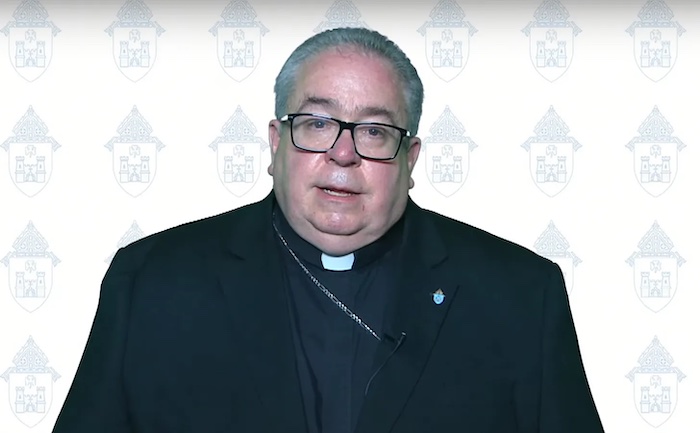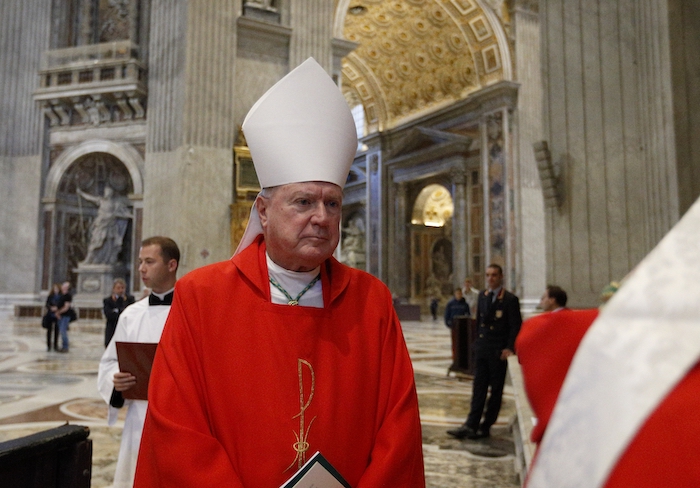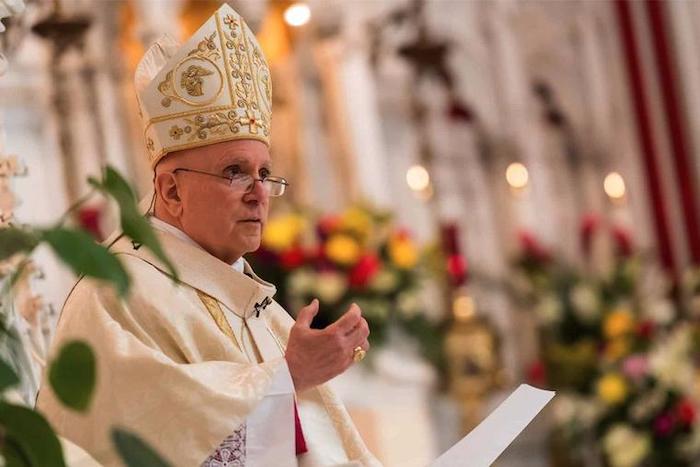— Fort Worth’s bishop said on Saturday that one or more nuns might have incurred on Friday an excommunication, because of a “scandalous and schismatic” statement issued by a Carmelite monastery in Arlington, Texas.

By The Pillar
While the bishop is competent to formally declare the nun excommunicated, he stopped short of that step Saturday, and did not indicate what his next steps might be.
Instead, Bishop Michael Olson warned Aug. 19 that Mother Teresa Agnes Gerlach might be excommunicated, along with several nuns living in the Arlington Carmel.
Olson wrote that on Friday, Gerlach “issued a public statement on the website of the Arlington Carmel by which she publicly rejected my authority as diocesan bishop and Pontifical Commissary.”
“Thus, it is with deep sorrow that I must inform the faithful of the Diocese of Fort Worth, that Mother Teresa Agnes, thereby, may have incurred upon herself latae sententiae ( i.e., by her own schismatic actions) excommunication,” Olson wrote.
The bishop’s warning came one day after a statement released on Friday from the Carmelite monastery of Arlington, Texas, in which both Gerlach and the monastery’s leadership group said they “no longer recognize the authority of, and can have no further relations with, the current Bishop of Fort Worth or his officials.”
Olson said Saturday that he believed the nun’s statement was an act of schism — a public rejection of his “authority as diocesan bishop and [as] pontifical commissary” of the nuns’ monastery. But while canon law would have permitted him to declare by decree that Gerlach was formally excommunicated, the bishop wrote instead only that her excommunication was a possibility.
He made a similar statement about the other nuns of the monastery, writing that they, “depending on their complicity in Mother Teresa Agnes’ publicly, scandalous and schismatic actions could possibly have incurred the same latae sententiae excommunication.”
It is not clear whether the bishop intends to initiate an administrative penal process to resolve clearly whether or not the nuns are excommunicated, or if the matter will remain ambiguous.
But Olson said the nuns’ monastery — over which the Vatican has given him authority amid a complicated dispute — “remains closed to public access until such time as the Arlington Carmel publicly disavows itself of these scandalous and schismatic actions of Mother Teresa Agnes.”
As the dispute continues, some sources close to the monastery have told The Pillar that Olson’s distinction between Gerlach and the other nuns could be significant — suggesting that Olson likely intends to urge the other nuns in the monastery to separate themselves from Gerlach.
Sources close to the monastery have told The Pillar that the nuns are facing acute psychological distress, and that some may not understand the stakes of the dispute.
Excommunication is an ecclesiastical penalty, intended to reform a Catholic who commits a significant canonical crime, and to encourage their repentance. A person who is excommunicated is prohibited from receiving sacraments or from exercising a leadership office in the Church.
In the case of Gerlach and other nuns, Olson suggested that they might have incurred a latae sententiae — or automatic — excommunication by their rejection of the bishop’s authority, which he characterized as an act of schism.
But because the bishop did not declare an excommunication formally, the nuns’ situation is ambiguous, limiting the practical effect of the “automatic” penalty in the administration of the monastery.
At issue could be Gerlach’s mental state. Amid a complicated dispute with Olson, the nun has claimed to be impacted at various times by significant medications. If her mental capacity is presently diminished by medication, canon law would require that Olson assign to her a lesser penalty than excommunication — and the bishop may intend to undertake a relatively thorough canonical process before declaring a penalty, in light of that possibility.
The bishop’s statement did not specify whether that is the case, or whether there are other reasons why he stopped short of formally declaring a penalty, even while characterizing the nuns’ actions as schismatic.
Canonists have suggested to The Pillar that in addition to his public statement, Olson could have issued to the nuns a formal canonical warning that they must repudiate the Aug. 18 statement within a certain timeframe, or see their excommunication publicly declared. But sources close to the monastery say there is no indication that Olson has yet sent any such formal warning, leaving his plans unclear.
The conflict between Bishop Olson and the nuns of the Carmelite Monastery of the Most Holy Trinity has been ongoing for several months, since Olson in May initiated a canonical investigation into their superior, Mother Teresa Agnes Gerlach, for allegedly admitting to violating her vow of chastity with an unnamed priest.
Lawyers for the convent and for Gerlach, both civil and canonical, have said that her supposed admission of an affair was made following a serious medical procedure, under the influence of painkillers, and when she was in and out of lucidity.
Olson, however, said the prioress had repeated her admission to him during an in-person conversation, in the presence of several other individuals. He said Gerlach was lucid and spoke clearly at the time, and was not recovering from surgery at the time.
The bishop claimed that the nun named the priest — who was identified in June by his diocese as Fr. Philip Johnson of the Diocese of Raleigh — during that conversation, and that the priest’s diocese of residence, his immediate superior, and his bishop had all been informed of the situation.
>The nuns, in response, filed a million-dollar civil suit against the bishop, as well as a criminal complaint alleging that Olson had stolen their property by seizing their phones and computers during a search of the convent. They have suggested that the bishop’s actions are financially motivated, and that he is seeking their donor list.
The bishop told the sisters he was restricting their access to Mass and confession until they withdrew the lawsuit. He restored their access to the sacraments on June 1, when he also issued a decree dismissing Gerlach.
His decree came one day after the Vatican appointed Olson “pontifical commissary” for the sisters and retroactively sanated any and all canonical procedural issues raised by Olson’s previous actions involving the monastery.
In June, the diocese also said that it was in communication with the local police department regarding serious concerns over “the use of marijuana and edibles at the monastery,” along with what it called “other issues that the diocese will address at another time and in a proper forum.”
The diocese released photos which it says are from the inside of the monastery. The images appear to show an office with several tables strewn with drug paraphernalia, dispensary bottles, branded marijuana products, bongs, and a crucifix.
But the nuns have apparently continued to recognize Gerlach as their superior, and they have made various appeals to Rome, including the objection that Olson had employed powers reserved for a criminal canonical investigation despite the mother superior’s alleged actions — while sinful — not constituting a specific crime in canon law.
The conflict escalated Friday, when the nuns released an unexpected statement rejecting Olson’s authority, alleging months of “unprecedented interference, intimidation, aggression, private and public humiliation and spiritual manipulation as the direct result of the attitudes and ambitions of the current Bishop of Fort Worth.”
“No one who abuses us as has the current Bishop of Fort Worth, has any right to our cooperation or obedience,” the statement said.
“For our own spiritual and psychological safety, and in justice, we must remain independent of this Bishop until such time as he repents of the abuse to which he has subjected us, apologizes in person to our community for it and accepts to make due public reparation,” the nuns wrote.
They also released on Friday a statement of support apparently written by former U.S. apostolic nuncio Archbishop Carlo Vigano.
“The repeated abuses of power by those who hold ecclesiastical Authority over religious Communities – especially communities of contemplative women – are part of a subversive plan carried out by corrupt and heretical Prelates whose purpose is to deprive the Church of the Graces which such Consecrated souls cause to descend upon Her,” the statement said.
The Vigano statement connected the conflict in Texas to Vigano’s long standing criticism of Pope Francis.
“I invite everyone to support the courageous resistance of the Carmelite Nuns of Arlington with prayer and material help, not only for the sake of supporting them but also in order to send a clear signal to those in the Church who believe that they hold absolute power, even to the point of contradicting with impunity the Authority of Christ, the Head of the Mystical Body.”
Those Friday statements from the Carmel prompted Olson’s Saturday statement, in which the bishop said that the Carmelite statement “has hurt me as a friend and as the bishop because of the deep wound this has cut in our unity as the Diocese of Fort Worth.”
Olson wrote that he “stand[s] ready to assist Mother Teresa Agnes on her path of reconciliation and healing.”
But while he addresses problems in the monastery, some Catholics in Fort Worth say that Olson has a record of acting rashly, or autocratically, amid disputes in the diocese. Some point to a group of Catholics which has submitted a petition to the Vatican calling for Olson’s removal, citing the Carmelite conflict and several other issues. The group says more than 900 people have signed a petition sent to the Vatican.
For his part, Olson has insisted that he is concerned for the spiritual welfare of his diocese.
“Since the late 1950’s the nuns of the Carmelite Monastery have sustained so many of us in our times of doubt, sickness, and grief with their prayers and devotion to their Carmelite vocations to pray in communion with the Church. Their example of prayerful fidelity has for many years strengthened the mission of Christ’s Holy Catholic Church in North Texas. I have personally relied on their prayers and have enjoyed a spiritual friendship with so many of the nuns,” he wrote Saturday.
“Please join me in praying for the nuns, and the restoration of order and stability to our beloved Arlington Carmel. May Saint Teresa of Jesus intercede on their and our behalf,” he added.
Complete Article ↪HERE↩!





